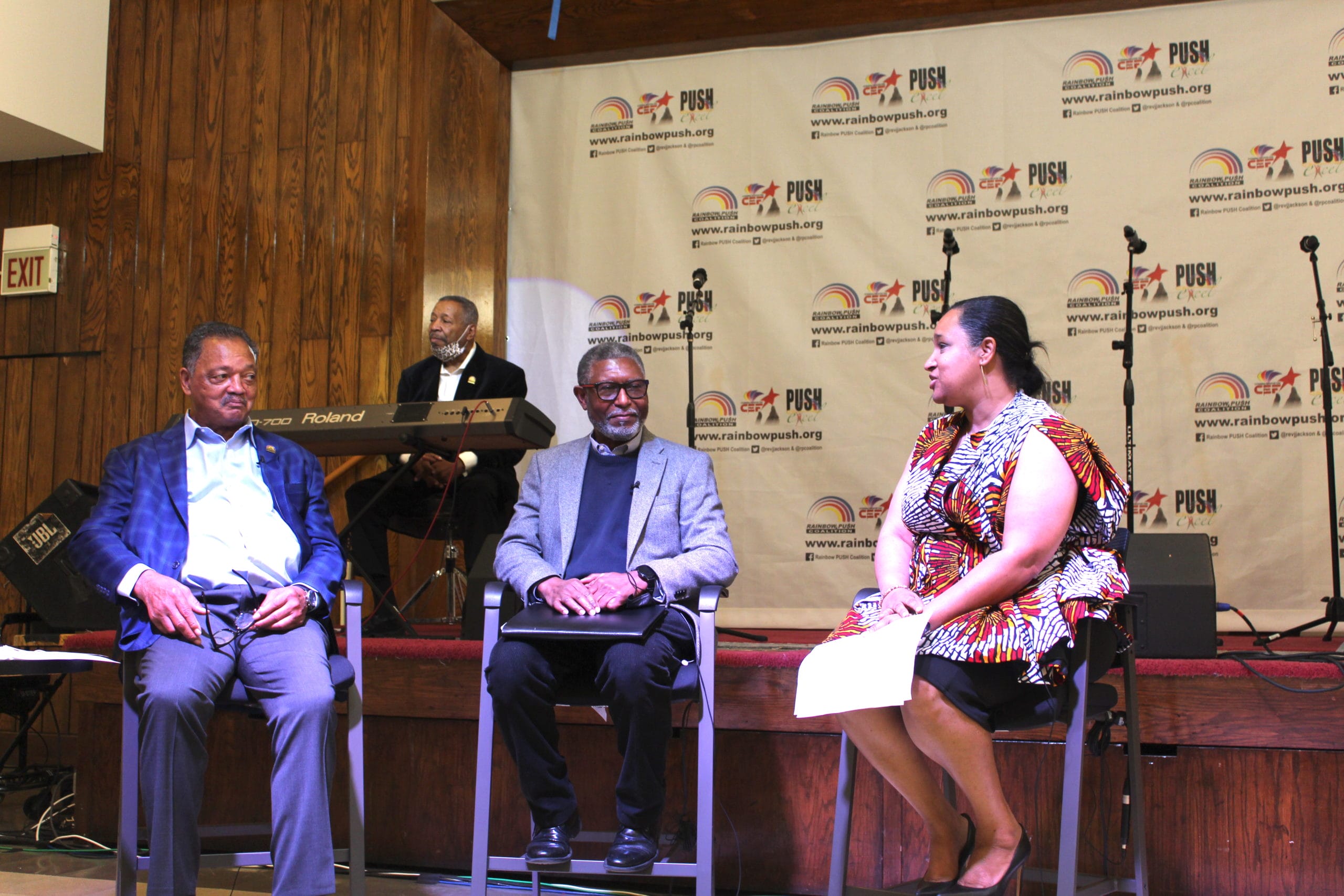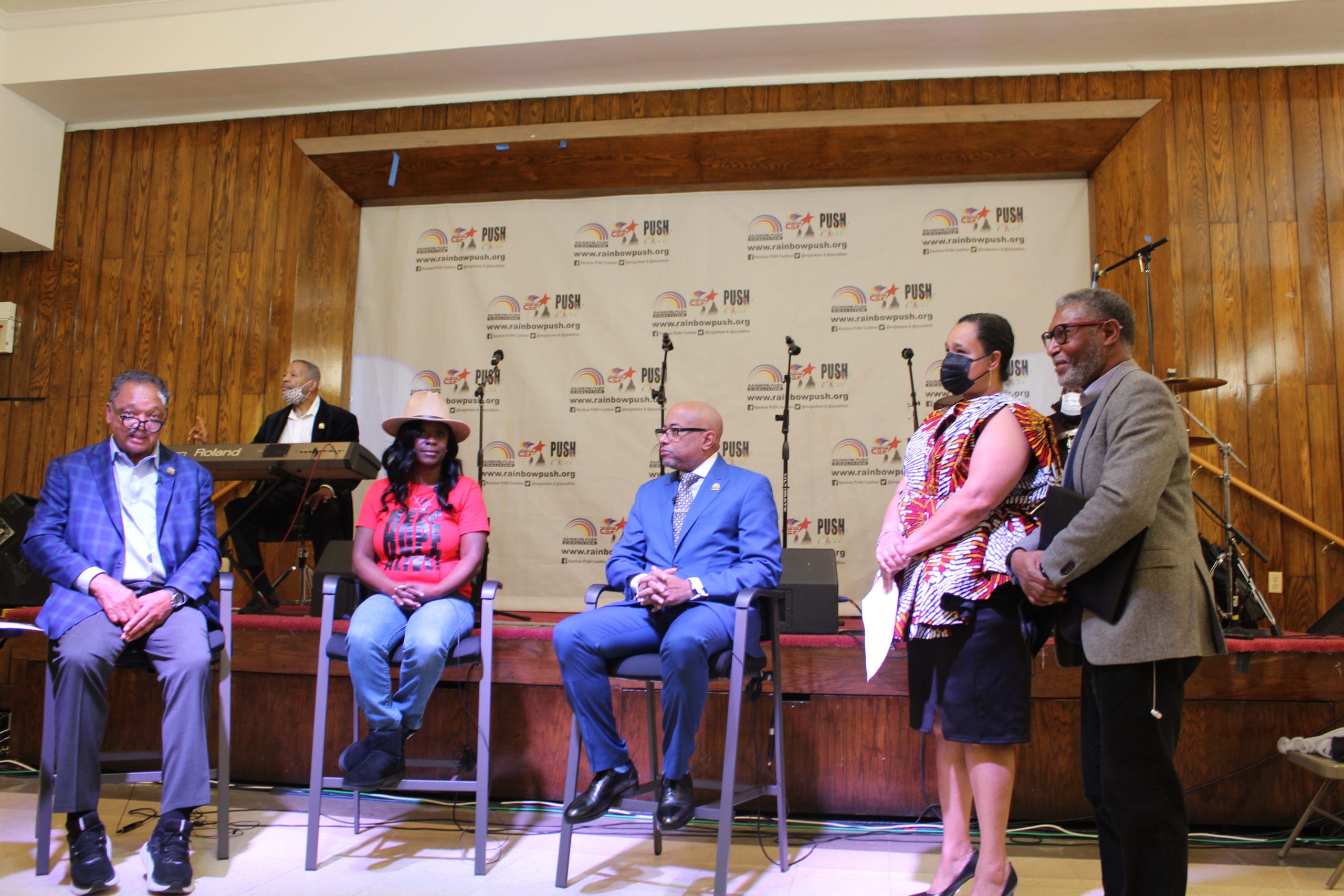Haitian leaders reached out to Reverend Jesse Jackson to help them “reset” the strained relationships between the U.S. and Haiti. They say the country is “broke” and needs a Marshall Plan to survive, including reparations and restitution, which they say is owed their nation.
“America cannot escape responsibility for what has happened in Haiti,” said Etzer Cantave, chairman of the Public Policy and Advocacy for the Coalition of Haitian American Organizations in Chicago. He was accompanied by Lisa Laude, a member of that organization, on Saturday, October 30, at the Rainbow PUSH Coalition headquarters.

“The Marshall Plan would be like what the U.S. did for Europe after WWII,” Cantave said. He was referring to the U.S. Marshall Plan that aided in the economic recovery of nations after WWII that helped to secure U.S. geopolitical influences over Western Europe.
“We’re putting everything on the table. We’re back to square one,” he said. “Haiti would not be asking for aid but for restitution and reparations for what is due to us. We are asking everybody.”
Jackson said the U.S. does owe Haiti a debt, given their help in fighting alongside the colonists against the British during the Revolutionary War and the Louisiana Purchase. “We owe Haiti a debt,” said Jackson.
As another example of Haiti being abused by the U.S., Cantave referred to the Island of Navassa where he said the U.S. seized that island and exploited guano which is the main ingredient in fertilizers. Congress passed the Guano Islands Act of August 18, 1856 allowing the U.S. to exploit Haiti for a number of years. “We never got a penny out of it,” Cantave said.
“The U.S. took possession of that island and exploited guano, which is the excrement of bats that is a very important ingredient in the production of fertilizer,” Contavestated.
“Since 1856, the island has been under occupation by the U.S., and we never got a penny out of it. By conservative estimates, Haiti lost $100 billion. The U.S. still occupies the island. We can’t use it for anything,” he said.
According to the U.S. Department of the Interior, “all operations (on that island) became effectively uninhabited.” However, Cantave said Haitians can use that island for producing guano for themselves.
That is why Cantave is asking the U.S. Congress to repeal the 1856 Guano Islands Act. “We have been having meetings with the staff of Illinois Representative Lauren Underwood and the staff of Senator Dick Durbin and Senator Tammy Duckworth.
When asked if he is meeting with the Congressional Black Caucus, Cantave said, “We are going one-by- one” and will soon meet with the staff of Representative Bobby L. Rush.
Cantave said Haitians also want France to pay reparations. Echoing what Jackson said earlier during the Saturday morning broadcast, Cantave said, “We won our independence against France. We beat them and now had to pay them at least $20 billion in reparations.” Shaking his head, Cantave said that it is not fair that Haitians defeated France and the loser forced them to pay them reparations. France, he said, owes Haiti as well.

Cantave said Haitians have filed a lawsuit against France seeking those reparation payments, but he explained Haiti is seeking similar requests from many fronts…from those he says exploited and abused Haiti all because they were the first Africans to win their independence.
“The United Nations is included,” he said. “In 2010, the U.N.’s peace- keepers brought cholera to Haiti.” He said Haiti was cholera-free, but when they came to Haiti, “they introduced cholera infecting 800,000 Haitians with 10,000 dying.”
“The U.N. has a legal responsibility to pay Haiti reparations, too,” Cantave said. “What we want is reparations, restitution and compensation.”
When reminded that the U.S is giving Haiti some funds, Cantave said, “They have been putting band aids over gashing wounds. The aid is a different formula.”
Cantave said the late Haitian President Jovenel Moïse “didn’t get much aid from the U.S. That is not what we were due.”
Asked about the Biden administration’s policy toward Haiti, Cantave said, “No due process was applied because they sent the Haitians back to Haiti. Most of the Haitians did not come from Haiti directly. They came from South America.
“After the first earthquake in 2010, they had settled in Brazil and Chile, but the situations there have changed. When they came to the U.S., the U.S. just grabbed them and shipped them back to Haiti where they were not residents of Haiti.” He said after deporting them to Haiti, the U.S. gave each person $50 and another $50 for a phone. “All of that needs to be addressed,” Cantave said.
“We are asking the Illinois Congressional delegation to take the lead on getting the Guano Islands Act of 1856 repealed.
We are waiting for the Congressional Black Caucus to schedule a meeting with us,” he said.






